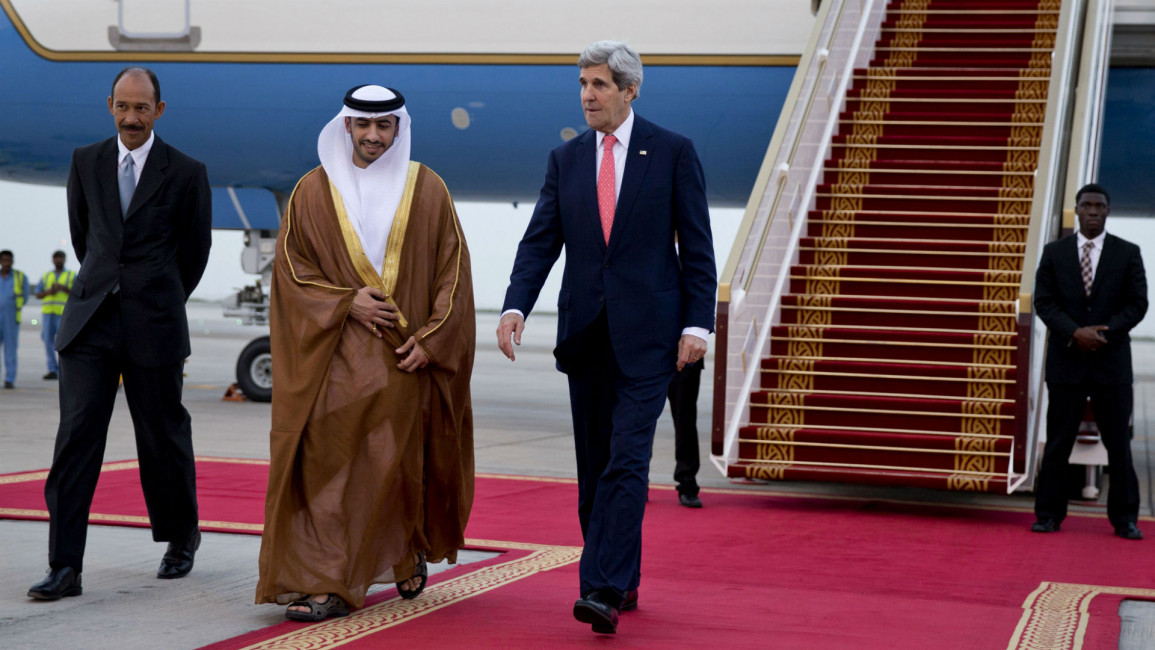
The Arabs' alliance with the US
What is the significance of the alliance between Arab regimes and the US? Though the question may appear trivial in light of their well-established relations, and because these regimes nearly completely rely on the US defence umbrella, it is difficult not to probe deeper into this alliance.
Generally Arab regimes view this alliance through the prism of their own security. Or, in other words, the security of the ruling family or clique, and not necessarily national security in the way it is understood by Western liberal democracies.
This means the US military umbrella is much more important to these regimes than building independent national military capabilities that repel aggression and maintain national security. Perhaps this also highlights the regimes’ mistrust of local military and security services.
For the US, the alliance is about linking the entire region to US interests and making it part of US national security. The alliance also means countries depend on US protection.
There is also a kind of Arab political narcissism involved in this alliance, with Arab regimes boasting of their bonds and "strategic partnership" with the US.
Of course, countries need a strong relationship with the world's superpower, especially due to the precarious security landscape. The problem is not the relationship with the US per se, but the way it manifests.
The alliance has mired Arab governments in confusion and structural contradictions between individual national security and overall Arab national security. Indeed, the US strategy conflicts with some if not most Arab interests, even the interests of individual Arab countries and regimes.
The Arab regimes in question have made two cardinal errors by formulating a relationship with the US.
| The alliance with the US has marred Arab governments in confusion and structural contradictions. |
First, they falsely believe an alliance with the US is all-encompassing, and based on security and military foundations. However, an alliance does not necessarily mean full political agreement on all issues. Indeed, the same could be said about strategic alliances between Western countries, which does not prevent political and economic competition between them.
This explains perhaps Arab disappointment over events in Iraq. These Arab regimes supported and facilitated the US-led invasion and occupation of Iraq. They sanctioned the US plan, falsely believing the US viewed the crisis in Iraq in the same way they did. But the US had different plans, governed by its national interests and strategic blunders.
Arab regimes that feel strongly about the need to confront Iran, helped the US place Iraq under Iranian domination. The Gulf countries, paradoxically, helped depose Saddam Hussein at a time when Iraq was at its weakest. It threw Iraq into the arms of Iran. The result is that Iran is now in a better stratrgic position than ever before and the Arab regimes concerned have only themselves to blame.
Yet they did not learn the lesson and rethink the nature of the relationship with the US. This is mainly because the sacred criteria remains the security of the ruling regimes at the expense of the security of the Arab nations. Today, a number of Arab countries are on maximum political alert because of the nuclear deal between the West and Iran. Regardless of whether their stance is valid, the basic conclusion here is that the strategic ally of a number of Arab regimes does not assign any importance to their vision on certain regional issues.
In effect, this is predictable and inevitable. The US, which has little regard for its Arab allies on the Israeli-Palestinian conflict, cannot be expected to act any differently vis-a-vis other less important regional issues. Some Arabs have made the mistake of falsely believing there is a US-Arab accord on Iran. In other words, these Arabs have ignored a fundamental political rule: interests are not static, but dynamic, and are determined by context.
The second cardinal error was Arab regimes' belief in the effectiveness of the US security umbrella. The US protective umbrella is not absolute.
The US umbrella, for example, does not protect any Arab side no matter how close they are from Israeli aggression. Over time, these Arab countries have accepted this grudgingly. The alliance with the US is meant to protect them essentially from other Arab nations or regional powers, especially Iran.
Here lies the root cause of the Arab strategic impasse. All the Arab countries that the US labels as an essential ally outside NATO are aware that this status does not shield them from all attacks.
The two strategic mistakes, the lack of vision, and the conflation of Arab regimes' security with Arab national security, has produced a fundamental flaw in the Arab security structure. The most prominent manifestation of this is this state of total Arab security exposure. Arab countries have sacrificed Arab national security interest to serve their own narrow security interests. But they even failed to achieve that and ended up losing on both levels.
The upshot is that Arab countries that could play a major role in building an independent Arab security structure are strategically linked, to begin with, to forces opposed to the idea of Arab national security.
In addition, regimes in these countries probably do not believe in the idea of national security, but only exploit the concept for their narrow interests.
This article is an edited translation from our Arabic edition.
Opinions expressed in this article remain those of the author and do not necessarily reflect those of al-Araby al-Jadeed, its editorial board or staff.




